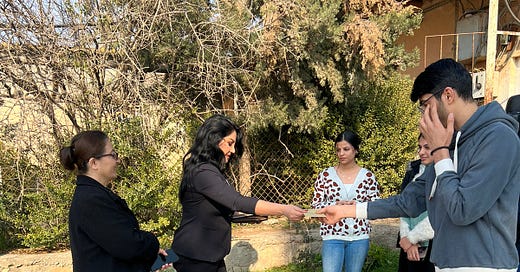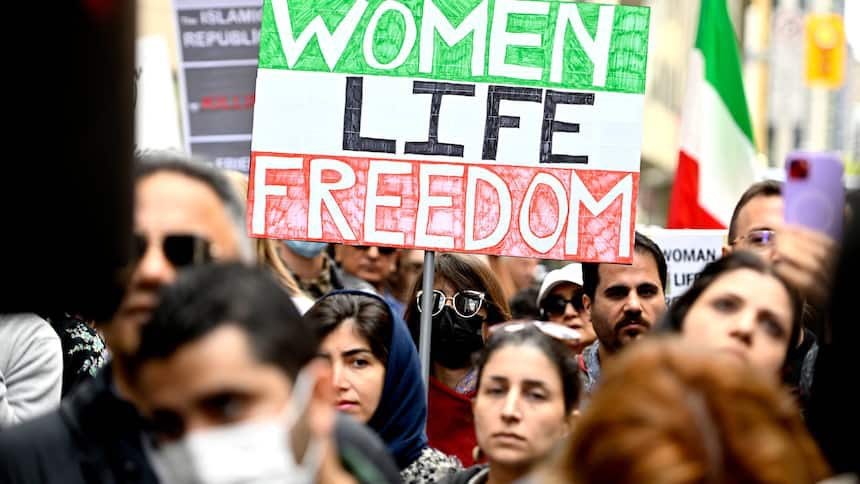Safety Net for Kurds Fleeing Iran
As the killings, disappearances and executions mount, some protesters are forced to flee Iran at a moment’s notice.
Gulbakh Bahrami is quick to recognize the suffering on the faces of Iranian Kurds. She knows what they have endured to reach Iraqi Kurdistan and the desperate state in which they arrive. “Most come through the mountains via smugglers, with only the clothes on their backs. They bring nothing with them so they need everything – food, clothes, medical checkups, a place to live,” says Bahrami, who founded the Hiway Rojhalat Organization to support Kurdish families fleeing Iran.
She remembers how it felt to reach safety after a long and dangerous journey, then realize there is no plan for what comes next. “The hardest part is starting a new life from scratch, it’s very difficult,” she says. Bahrami and her husband fled Iran in 2010 after being arrested multiple times for their work as writers and activists. “The last time we were released on bail we escaped, and then the news came that a prison sentence had been issued for us, so now we can never go back,” she says.
Their journey to Iraqi Kurdistan was a grueling 16-hour slog on foot, with fear of arrest stalking every step. “There’s a big chance you could get caught at any time and we were worried about our four-year-old son - what would happen to him if they took us,” she says. The family finally crossed the border into Iraqi Kurdistan, but in many ways, the hardest part was still to come. “It was very tough in the beginning, we worked every day from 6 am to midnight to make a life here.”
The demonstrations that have spread across Iran since the death of 22-year-old Kurdish woman Mahsa Amini in police custody last September has sparked another exodus of people, many fleeing violent repression from the regime. “They are mainly activists who were advocating for the rights of their nation and now they are under surveillance,” Bahrami says. Most are just beginning the process of starting their lives in Iraqi Kurdistan, unsure how to find work, afford food, or secure a place to live. “If these people had stayed in Iran they would probably have faced long-term prison sentences or execution,” adds Bahrami.
At least 519 protesters have been killed in the unrest, according to the Human Rights Activists News Agency (HRANA), while another 19,290 have been arrested as the regime attempts to face down the mounting threat to its decades-long rule. So far, Iranian authorities have executed four protesters while eleven more await the death penalty and over 100 people face charges that could also result in death sentences. Over 19,000 have been arrested. Many of the Kurds Bahrami works with fled quickly when they realized they could be next. “When I provide help to these people it reminds me of the journey I took to get here. I feel I am helping myself because I was in their position years ago.”
In the past six years, Bahrami estimates she has reached around 2,000 people, targeting 200 to 400 with each new project. An Innovation Hub grant from Ideas Beyond Borders is funding another round of support, allowing Bahrami to purchase food, clothing, school materials and medical supplies for people who suddenly find themselves with nothing, after becoming a target of the regime.
“These people have sacrificed everything for the future of their country and the belief that a better future is possible for Iran. Now they find themselves without a home, forced to leave behind all they know and start again,” says Faisal Al Mutar, President of Ideas Beyond Borders. “The Hiwai Rojhalat Organization is providing them with the means to do that, offering support and supplies when they need it most.”
Bahrami knows she can never return to Iran, at least not under the current regime, but as the protests enter their seventh month, she’s hopeful that a turning point is in sight. “This has been a long-awaited revolution. The regime has ruled the country for decades and oppressed its people, but the killing of Jina (Mahsa) Amini has triggered a new wave of fury. People are braver and bolder, not scared as they have been in the past. Maybe this time it will spread and we will get our freedom.”





